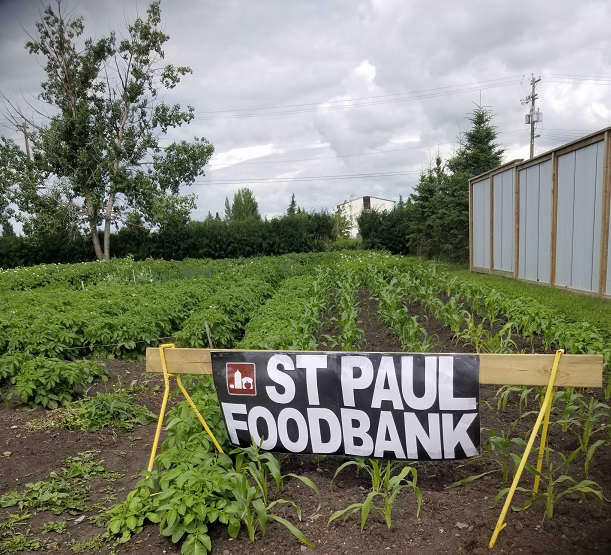The Town of St. Paul, almost 500 km north-east of Calgary, is reportedly the home to the world’s first UFO landing pad. While UFOs might be a draw for the tourists, it’s another fixture that is popular with the locals: a blossoming Community Garden.
From visiting to volunteering
It was David Robinson’s connection with the local food bank that first brought him to the Community Garden in 2013. “I was there to collect produce for the St. Paul & District Food Bank where I volunteered. The garden was full of vegetables, rows and rows of them. And there were innovative gardening methods being used. I wanted to be part of that,” remembers David, an empty nester, avid volunteer and composting enthusiast. A resident of St. Paul since he was 10 years old, David was so impressed with the Community Garden during that first visit that he’s been volunteering at it ever since, first as a gardener and now as its leader.

Founded in 2006, the garden is at the heart of St. Paul. It is overseen by the St. Paul Community Garden Society — a non-profit group of gardeners, with a Board of Directors led by David as its chair. What David identified early on as making the garden truly special is how it focuses on supporting the community in a variety of innovative ways.
More than just a garden
The Community Garden provides opportunities for residents to produce larger quantities of their own healthy produce. “In 2020, thirty participating St. Paul residents were able to rent plots at a minimal cost and harvest the types of produce that best-suited their tastes and dietary requirements,” David explains.
David’s motivation for the many hours he puts into the Community Garden is seeing first-hand how the participating residents empower each other to live healthier. “People have the opportunity to supplement their diet and raise good food themselves,” he explains. “Food is expensive in the store, but a garden plot reduces the cost of produce. The production of produce is the biggest benefit the Community Garden can offer.”
The year of potatoes
Each year, the Garden Society dedicates one plot to the St. Paul & District Food Bank and chooses a single crop to grow in it. In 2020, potatoes were the chosen plant to donate, as they’re commonly used and versatile in the kitchen. Over 460 kilograms of potatoes from the dedicated plot were harvested! Quite the haul of spuds, the potatoes were then donated to the St. Paul & District Food Bank where David also continues to volunteer. At one kilo per client, 460 people left the food bank with fresh local food.

The diverse members of the Garden Society
Word has spread about the Community Garden and its volunteers and David feels a lot of support from locals. The interest comes from people of all ages. “We’ve seen a few seniors, who have moved off a farm, come volunteer with us. We also have families with younger children that are helping. Some families have three or four kids helping. The children seem to enjoy it.”
A large number of new Canadians rent plots at the Community Garden and are able to grow vegetables that are unique to their cultures. These new Canadian families have noted that gardening “gives them a feeling of belonging to the community of St. Paul,” David explains.
A trusty new tractor
David helps the 25 gardening volunteers with the tools and equipment they need to take care of their plots. One piece of equipment the volunteers are using is a newly-purchased tractor, which allowed for a major expansion of the garden. When David first started volunteering at the Community Garden, there were 25 plots. Now, with help from the tractor, the garden has since grown to 45 plots. David explains that the tractor “has reduced the amount of manual labor in all aspects of gardening, including the construction of six raised garden beds.” The tractor was purchased with help from Agriculture and Agri-Food Canada’s Local Food Infrastructure Fund.
The certainty of the Community Garden is more important than ever during the uncertainty of COVID-19. The recently-purchased garden tractor meant the Community Garden could meet Alberta’s pandemic protocols and continue operating. “Rather than multiple individuals operating the same pieces of equipment and tools such as rototillers to prepare the garden plots for planting, the garden tractor allowed one operator to complete rototilling for the entire garden in the spring and again in the fall. The tractor has reduced the amount of manual labor in all aspects of gardening, including the construction of six raised garden beds and has resulted in less close contact between gardeners,” he explains.
More vegetables grown in the St. Paul Community Garden means more healthy and well-fed families—a goal that is ever so much more earthy and real than the possibility of a UFO landing.
To make a donation to your local food bank, please visit Food Banks Canada. To learn more about the Local Food Infrastructure Fund, including how and when to apply, visit the program’s page on the Agriculture and Agri-food Canada website.
Get more Agri-info
- Want more stories like this? Explore what else Agri-info has to offer.
- Interested in reporting on this story? Contact AAFC Media Relations at aafc.mediarelations-relationsmedias.aac@agr.gc.ca to arrange an interview with one of our experts.